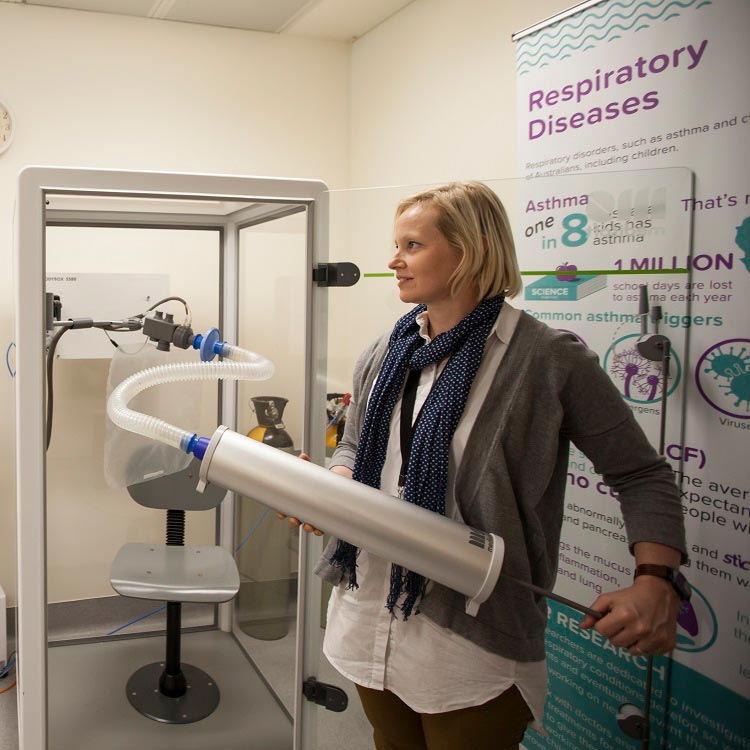Search

News & Events
Lung study helps history-making generation get a handle on their healthA lung function study carried out by Dr Shannon Simpson provided the most comprehensive follow-up of very pre-term children of any study so far carried out on the lung health of this vulnerable group.
Research
Cultures of HRV-C for investigations of pathogenesis in childrenAnthony Belinda Ingrid Kicic Hales Laing BSc (Hons) PhD BSc (Hons) PhD BSc PhD Rothwell Family Fellow; Head, Airway Epithelial Research Senior
Research
Improved diagnosis, treatment and prevention of recurrent tonsillitisStrep A causes over 775 million infections each year world-wide, including over 615 million cases of tonsil infection (Strep throat).
Research
Vulnerable from the first breath - epithelial dysfunction and respiratory outcomes in childrenWe have been studying the importance of the epithelial cells lining the airways in the nose and lungs.

News & Events
Very preterm babies at risk of declining lung function throughout childhoodA The Kids Research Institute Australia study published in The Lancet Child & Adolescent Health has found that survivors of very preterm birth face declining lung function
Research
A primary cell model of the very preterm epithelium reveals barrier defects at 1 year of ageLimited evidence suggests that airway epithelial structure and function is disrupted in very preterm infants; however, the epithelial morphology and physiology has not been well characterised following discharge from neonatal intensive care. This study aimed to characterise the nasal airway epithelium from 1-year-old survivors of very preterm birth.
Research
Intranasal phage therapy overcomes antibody neutralization challenges in pulmonary Pseudomonas aeruginosa infectionsPhage therapy is a promising approach against multidrug-resistant infections, yet systemic administration can lead to incomplete cures. We investigated the distribution, immune responses, and efficacy of the therapeutic phage KPP10 delivered via intranasal or intraperitoneal routes in murine Pseudomonas aeruginosa lung infection models.
Research
The effects of e-cigarette use on asthma severity in adult BALB/c miceElectronic cigarettes (e-cigarettes) are often perceived to be a less harmful alternative to tobacco cigarettes. Potentially due to this perception, they are used by people with pre-existing respiratory conditions, such as asthma, who otherwise would not smoke. Despite this, there are few studies exploring the health effects of e-cigarette use on pre-existing asthma.
Research
Complete genome sequence of Burkholderia cenocepacia bacteriophage Karil-mokiny-1Burkholderia cepacia complex causes life-threatening respiratory infections. Here, a bacteriophage with activity against B. cenocepacia was isolated from wastewater. It has a genome size of 70,144 bp and has the taxonomic classification Irusalimvirus. It has no genes associated with lysogeny, bacterial resistance, or virulence.
Research
Streptococcus pyogenes Surveillance Through Surface Swab Samples to Track the Emergence of Streptococcal Toxic Shock Syndrome in Rural JapanJapan recently experienced a record surge in streptococcal toxic shock syndrome. Our environmental surveillance study reveals that Streptococcus pyogenes persists seasonally, peaking in autumn and winter in rural Japan. The dominant emm1 M1UK sublineage and csrS mutations heighten virulence, highlighting the urgent need for targeted surveillance and interventions.
